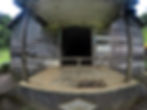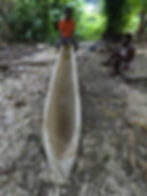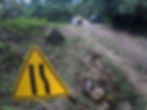Being White-Being Native... Being in Vanuatu
- Gail Varga
- Aug 23, 2019
- 9 min read
Updated: Mar 6, 2021
In Vanuatu white values are OUT and island values are IN… generally speaking. When they gained independence from European colonial powers more than 30 years ago, ALL the white colonists left, gave up their properties and lost rights to remain. The importance of this cannot be overstated because, to this day, outside the areas around the two major towns (Luganville and Port Vila), there are NO WHITE RESIDENTS, and very few white visitors as well.
It is an event when a white visitor comes by, and children who know no other English word cry out, ‘Hello!-hello!-hello!-hello!-hello!-hello!-hello!-hello!’ in rapid fire.

If I come close they may want to touch me, stroke the white skin of my leg, fondle or even plait my strange, slippery blonde hair, chatter and coo, but equally they might become shy, bury themselves in their mothers’ skirts or even, in the case of smaller ones, burst into tears and become terribly frightened. These children may have rarely, if ever, seen a white person before.
I admit that there is a sometimes gratifying feeling of minor celebrity in all this which can be nice, but is also (obviously) based on nothing at all, and can feel silly. At these silly-feeling times, I welcome the locals who ignore me, or just give me the customary acknowledgement that is due to any member of their community. But even knowing what is the customary acknowledgement of another can be tricky to fully understand...
Unlike being in first world social company, there is no awkwardness about having to hang out with people for a socially comfortable length of time, and no feeling that taking leave of someone is rude. How nice!
Thank you’s feel problematic for me sometimes though. Think of all the time that was spent on us (and we spend on our children) by way of schooling in the fine art of ‘Thank You’: which words to say, letters of thanks and, above all, showing our commitment to the social grace of generosity by being thankful for things we don’t actually want. None of this schooling reaches ni-Vans, so when I make what I feel is a very generous or kind offer to someone, their lack of acknowledgement of me, my effort, the object, whatever it is, can be surprisingly deflating.
Sacred to the British in particular, even Football takes on new hues in Vanuatu. In Britain the level playing field is sacrosanct, whilst here they play in dust,

on ice-rink puddly mud

or tussocky weeds even in national competitions, and when the ball bounces back onto the pitch from the trunk of a frangipani or palm tree, this does not count as off-side. Scandalous! Football is equally for men and women, and both sexes are sporty. Volleyball for middle-aged women wearing wrap skirts seems popular!

Part of the benefit of the pattern of small community living in Vanuatu is that it is easy to feel safe and trust other people. I feel safer here in Vanuatu than I do in any developed country I have ever been to. Children play cooperatively without supervision, women are free to move and not be ogled or molested, property is unlocked and untouched. In all, behaviour is governed not by over-arching laws dictated (and transgressions admonished) by distant powers, but by basic interpersonal goodness developed over countless generations at a village level (and, of course, the understanding that you can’t get away with anything in such a small place).
Other kinds of safety can be eyebrow-raising for a cosseted Westerner though. Everybody, including small children have sharp knives and know how to use them. Some people seem to spend most of the day with a large machete in their hand, without any sense of threat ever exchanged. Equally the potential dangers of living within a very short distance of an active volcano whose flanks constitute the entire tiny island would be quite unthinkable to most people I know ‘back home’. The whole population of Ambae Island was evacuated last year when their volcano erupted and one entire village was swept away. Those that have returned obey a 1km exclusion zone around the crater itself, which seems all but a joke to me in terms of safety.
Christianity is something outside developed world expectations in Vanuatu as well. Locals have not dispensed entirely with commonly held beliefs in magic or with participation in native rituals, both of which seem to have been rationalised alongside and amongst their imported Christian church-going habits. They value very their Christian faith almost ridiculously highly, repeating the patter that they have been taught by missionaries for the last two centuries or so about Jesus clothing them and saving them from their dreadful cannibal ways, but, however much reverence they place in the bible, their sometimes strong traditional religious values still motivate them and very much colour their understanding of Christianity itself, not to mention their interpretation of the holiness of the church itself which, in some cases, goes well beyond ‘humble’.

Sexual politics is a tricky one, as the Western world is very touchy on this one. In Vanuatu equality is not the objective at all. Men and women share parenting responsibilities much more equally from what I can see, leaving women to be much freer from mothering than one could expect in a patriarchy, but men almost always do all the fishing, and women are even sometimes barred from fishing; they certainly never carve and construct the outrigger canoes.


Women generally do the cooking and are certainly in charge of the ground ovens in which they cook (amongst other things) the native dish laplap, a rubbery slab of pounded root vegetable usually served with coconut cream, which must go straight to the hips of any westerner who ever even looks at it, whereas most ni-Van seem quite slim at any age.

The ground oven involves heavy work with large, fire-hot stones, but even very elderly women can be seen doing this and other manual labour, carrying heavy baskets of garden produce or firewood, or picking up leaves, and a nearby lazing man would not get up to help them. Although the pace of life seems extremely slow, no-one is idle, not even the children, who are definitely not excluded from their share of participation in the garden, fishing and other domestic tasks. An important factor here is that most people do not have paid employment, instead they are gardeners and fishermen, living self-sufficiently.
Only men play tamtams (slit drums made from tree trunks played for ritual purposes) and the young women giggle when I suggest that they might want to play: how outrageous!

Status is earned by men through killing animals. Boys come of age by killing a number of chickens, chiefs go through their ‘grades’ by killing pigs in larger and larger numbers and of larger and larger size (wearing the boars tusks decoratively afterwards). Women on Ambrym tell me that female status also depends upon pigs, in their case upon ownership of pigs (they are in charge of feeding them, by hand if necessary when their tusks become too long), although they lament that there are so many wild pigs now that their status is ungraspable. I lament with them.
Aside from these traditional status values, one can up one’s standing in the community by, for instance, building a concrete house (rather than a ‘grass’ one, which most people have). This is familiar enough concept to me, but the houses are (my opinion) not only ugly relative to their ‘grass’ counterparts, but will be there for ever more in some state of decay after their time of use has run (looking even uglier).
A concrete house requires money to build, which usually comes through one of the younger men who often are hired to do piece work on Australian or NZ farms for a period of months (paid well below the minimum wage in those countries, note), and bring the money home. Those that have been abroad come back with all kinds of new ideas, some of which border on the cult of the individual which dominates all of us in the developed world. For most ni-Vans, clothes are clothes, not fashion items (any clothes I give as trade items are welcomed, and certainly not assessed for colour or fit, never mind label), but a minor cultivated choosiness may come home with the boys that have been picking fruit, a sense of ‘cool’. When I see this it serves to highlight the weariness I feel at coming from a culture that spends so much time, energy, resources and anxiety on such matters, but ironically highlights the aspects of this which I creatively enjoy…
There are yet more extraordinary aspects to the white/ni-Van wardrobe as well. Missionaries, over time, largely shamed islanders into wearing clothes: trousers and (t-)shirts for men and ‘mother hubbards’ for women (baggy, long, sleeved, patterned dresses- see above picture at the ground oven). Westerners have got past this and women wear all kinds of skimpy things these days, but equally ni-Vans never fully lost their traditional values and can be found in their old get-up even walking around town, but certainly at their ritual festivals. Women are in grass skirts only, and men in nambas (penis sheaths) and a belt only, all of which can be quite eye-opening, and certainly more liberated and body confident than almost anyone I know in the first world.

Almost all ‘white-isms’ in Vanuatu have a slight edge of comedy about them… Road signs: perhaps denoting the narrowing road where the cement mixer has been placed.

Cars indicating that they are turning or pulling over: there may be no other car on the whole island. Sunglasses: the principal at one school where I read with the children wears them all day long, and a young man who has ‘been to New Zealand’ wears transparent safety glasses on the top of his head for the cool factor. Organisation: paperwork as a means to organisation and control is a disease I suspect they have caught from white people, but they just can’t fully get to grips with the commitment it takes to make it matter (immigration, customs and other entry procedures as well as information storage in health clinics

and libraries are all cases in point).

Cleanliness and orderliness: old, broken building are just left, even the big Francophone church damaged in an earthquake still takes pride of place in the settlement.

Umbrellas: on the wetter islands they do use umbrellas, but are far from being rain shy as most ‘whites’, rather playing with the umbrella in the rain is quite a laugh.

Last but not least: Money. Money is most definitely the source of most conflicts between visitors and locals. For instance, ni-Vans are certainly subject to the lure of first world things, of which they have a very partial understanding, which creates all kinds of frustrations for visiting tourists who believe that, for example, the rules of the consumer game are universal, which belief also represents a very partial understanding.
Ni-Vans know how to contribute to the communal pot, share major possessions (a car or small boat might belong to the village) and to trade without money much better than we do. Lawrence, whose family owns one of the several cupboard-sized village shops selling very limited supplies on Pentecost Island, tells me that most locals pay for their purchases in kava. Kava is a root which, when ground up and drunk in water, the locals get stoned on (or at least the men do), which grows particularly well in the wet western islands. It is their export (as far as the capital), their income and, I see now, their currency. Interestingly, I find out that, although kava growing is widespread, it is not maximised in any way: if someone has a bill to pay (eg school fees), they simply dig up enough kava to pay for it and then carry on vegetable gardening and fishing for daily sustenance.
However, some ni-Vans have caught what I call the ‘white walking wallet syndrome’, and see anybody with white skin as someone who inevitably gives out money willy-nilly and exists to hand out goods from their bottomless supply of excess products that they carry around for the purpose. I feel that this is done not just out of a (perhaps misplaced) greed or desire, but also to try and give white people what they appear to want, which is, after all, commerce! Relatively small sums are routinely asked for nothing at all, or all but, in an effort to make the relationship or exchange seem credible in what they perceive as 'white' terms. It may, however, still be very significant money to a ni-Van villager, and therefore represents a profound distortion of normality as well as a potentially powerful source of corruption of their values in every way. Island communities where I find this might receive perhaps only 5-10 visiting yachts a year (average 10-20 visitors), and base their ideas about what white people are and what they want from this very limited exposure.
Obviously, I’ve only brushed the topic of our differences here, but, all in all, the cultural and social lessons I see here in Vanuatu have explosive potential, both in terms of learning good habits from those who are happier and making life work so much better than the developed world, or in terms of simply seeing our own ways for what they are, for better or worse.
But overall, let’s remember that mostly we are the same, and not different at all…
Click the gallery below for bigger versions of the pictures, and a lot of others from Penama Province in Vanuatu:













































































































